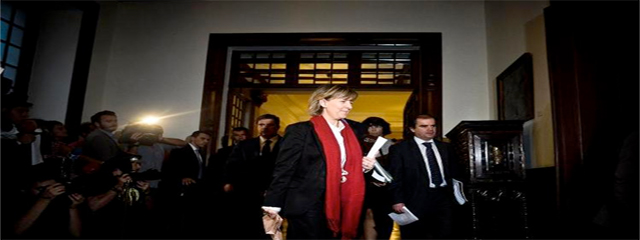Of note, in June the “troika” (ie, the EC, the ECB, the IMF) relaxed fiscal targets for this year and next to 5.5% and 4.0% of GDP, from 4.5% and 2.5%, respectively, under the previous programme.
The likely potential slippage of 0.3-0.4pp (c.EUR0.6bn) mentioned by Finance Minister Maria Luis Albuquerque during the budget press conference may explain the discrepancy compared with the size of fiscal consolidation announced by the government earlier this year. However, the FM also said the fiscal slippage was mainly due to one-off reasons (such as a port concession that was supposed to generate cash but has not been executed yet). Hence, it does not imply structural weak budget execution. Parliament debate should start on the 23 October and is likely to last about a month. The final vote should be held on 23 November.
While we had expected a fiscal slippage of 0.3pp this year, we think that achieving the 2014 target may become increasingly challenging for Portugal. Reform fatigue, weak growth dynamics and unfavourable constitutional court rulings could in fact weaken programme implementation and lead to fiscal slippages.
Overall, we continue to believe that Portugal may require additional official funds in 2014, either as a precautionary or a full programme. Moreover, we think that public debt relief would also be necessary to set public debt dynamics on a downward path. However, we expect that as long as the government avoids a political crisis, delivers pending reforms and broadly meets fiscal targets, the euro area will likely continue to fund the sovereign (for additional information, please refer to Portugal: More funding and debt relief needed, 14 August 2013)
Budget details:
Fiscal adjustment envisaged next year is worth EUR3.9bn in total, split as follows: expenditures cuts for EUR3.2bn; (net) additional taxes for EUR0.5bn; and one-off measures for EUR0.2bn. Within expenditures, the government said the wage bill will decline EUR1.3bn, social contribution by EUR0.9bn and other expenditures (including social security, intermediate consumption, subsidies and other current expenditures) will be cut by EUR1.0bn. According to various media (including Bloomberg) salaries of civil servants will be lowered by 6.2% (on average) between EUR600 and EUR2.0k per month and by 12% above that range. The retirement age will be also raised from 65 to 66. Finally, VAT on restaurants will remain at 23% instead of the 13% many have demanded. The government forecast GDP to grow 0.8% in 2014, while the unemployment rate is expected to be 17.7% (Barclays: 0.6% and 17.8%, respectively).






Be the first to comment on "Portugal: Potential fiscal slippage this year likely to set the bar higher for next"